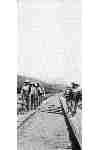
|
Internees returning from work, near Castle Mountain internment camp, Alberta (Photo from the Alpine Club of Canada Collection, courtesy of the Whyte Museum of the Canadian Rockies) |
Some Ukrainian-Canadian leaders are angry with Multiculturalism Minister Gerry Weiner for ignoring the internment of 8,500 of their countrymen during the First World War.
Within minutes of Prime Minister Mulroney offering atonement of $288 million for the wrongful internment of 22,000 Canadian of Japanese heritage during the Second World War, Weiner told reporters that no other community has been treated so badly or suffered so much.
"Their treatment was unparalleled," Weiner told a reporter who asked about compensation for other groups. "Members of this community have been moved, had their rights and privileges taken away. They were arbitrarily detained, roped off, disenfranchised and interned.
"There has never been an episode like this in Canadian post-Confederation history."
Weiner said he did not know what restitution was needed for Ukrainian Canadians.
The minister's remarks angered members of the Ukrainian Canadian Committee who, for two years, have been asking for a formal apology for the treatment Ukrainian Canadians received in 191420.
"Mr. Weiner does not know his Canadian history," Lubomyr Luciuk, a professor at Queens University, said yesterday.
"The precedent the government used to intern the Japanese in the Second World War was based on the detainment of Ukrainians during World War I.
"Their rights, their land and their families were taken away. Families were split up, men, women and children were sent to work camps far apart," Luciuk said.
Shortly after the bombing of Pearl Harbor on Dec. 7, 1941, Ottawa stripped some 22,000 JapaneseCanadians of their property and voting rights. They were transported from coastal areas in British Columbia to the province's interior and other Western sites.
Luciuk said 88,000 UkrainianCanadians were forced to register as enemy aliens and carry passbooks just because they were descendants of the Austro-Hungarian empire.
They, too, were denied the right to vote from 1917 to 1923.
The 8,500 forced to stay in internment camps were left there for two years after the war ended.
"These camps were the very same as those used in the Second World War -- the same camps that the government put genuine prisoners of war that they had captured," John Gregorovich, chairman of the Ukrainian Canadian Civil Liberties Commission, said.
Bill Werbeniuk, executive director of the Manitoba Ukrainian Canadian Committee, said the group met Weiner six weeks ago to discuss a formal apology to Ukrainians.
"We brought this to the minister's attention and we are progressing with discussions," he said. "We've let a number of ministers know of our wishes for restitution for the internment of many thousands of our ancestors."
The historic announcement yesterday marks the end of five years of negotiations between the federal government and the National Association of Japanese Canadians.
"No amount of money can right the wrong, undo the harm and heal the wounds," Mulroney told a silent Commons. "But it is symbolic of our determination to address this issue, not only in the moral sense but also in a tangible way."
Art Miki, president of the National Association of Japanese Canadians, said the day marked a celebration of nation building.
"We're delighted, very pleased," Miki said. "I've never been prouder to be a Canadian."
Of the 22,000 Japanese Canadians interned between 1941-49, the government will pay an estimated 14,000 survivors $21,000 each. There are an estimated 400 members of the internment in Manitoba.
The federal government will pay a further $36 million for community education and cultural activities as well as the establishment of a Canadian Race Relations Foundation.
Neither the government nor the Japanese organization have a list of those interned. Ottawa will spend $3 million attempting to locate as many of these people as possible.
Gregorovich said the Ukrainian Canadian Committee is not asking for any financial restitution for individuals because there are only a handful of survivors still alive.
Instead, it wants a formal apology, a small amount of research money and a number of roadside plaques where chain-gangs of interned Ukrainian Canadians were forced to build highways and bridges.
![]() Return to Righting An Injustice Page
Return to Righting An Injustice Page
![]() Return to Internment of Ukrainians in Canada 1914-1920 Page
Return to Internment of Ukrainians in Canada 1914-1920 Page
![]() Return to Ukrainian History Page
Return to Ukrainian History Page
![]() Return to InfoUkes Home Page
Return to InfoUkes Home Page
Document URL: http://www.infoukes.com/history/internment/booklet02/doc-013.html
Copyright © 1994 Ukrainian Canadian Civil Liberties Association
Copyright © 1994 Lubomyr Luciuk
We acknowledge the help in the preparation of this document by Amanda Anderson
Page layout, design, integration, and maintenance by G.W. Kokodyniak and V. Pawlowsky
Copyright © 1996-1997 InfoUkes Inc.
E-mail: internment@infoukes.com
|
since Mar 1 1997 |
InfoUkes Inc. Suite 185, 3044 Bloor Street West Etobicoke, Ontario, Canada M8X 2Y8 Tel: (416) 236-4865 Fax: (416) 766-5704 |
Originally Composed: Sunday September 22nd 1996.
Date last modified: Thursday October 30th 1997.